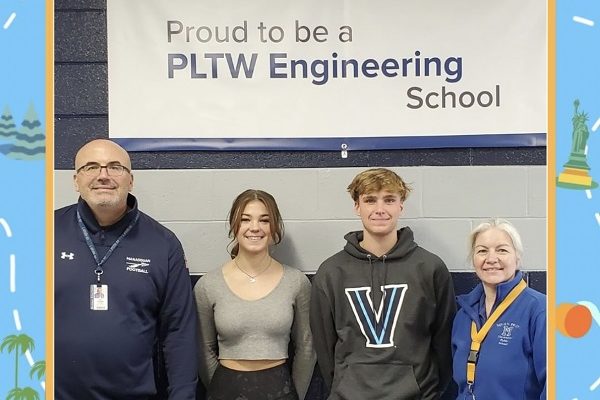Five New Jersey Schools Advance in Samsung’s $2 Million National STEM Contest
Five New Jersey schools are among the nation’s 100 State Winners in the 12th annual Samsung Solve for Tomorrow Education Contest. Solve for Tomorrow is a program that encourages 6th to 12th grade students and their teachers to creatively use science, technology, engineering and math (STEM) skills to tackle local issues of national importance, while keeping sustainability in mind.
In 2018, we covered a student team from Cavallini Middle School, in Upper Saddle River, which made it through all the way to the finals, emerging as one of three national winners. Samsung Electronics America is located in Ridgefield Park.
The State Winner teams were chosen based on their creative and strategic proposals for solving complicated issues that affect their communities by using STEM learning. Each State Winner will be awarded $6,500, to be redeemed from the website of DonorsChoose, a nonprofit organization, along with a video kit to help them with the next phase of the contest.
The participating teachers and students from each of the 100 State Winner schools will record a video to showcase their projects in the hope of advancing through future phases of the contest, to win additional prizes and educational opportunities.
“Empowered and inspired to elicit change, Gen Z students are catalysts for making the world a better place. It is truly an honor to watch students from across the country channel this passion and drive into the Samsung Solve for Tomorrow Contest to address problems in their community head-on,” said Ann Woo, senior director of corporate citizenship at Samsung Electronics America. “As change agents for the future, this year’s State Winners are taking action to create tangible solutions that address a wide range of important issues impacting their generation.”
The schools and their projects are:
Manasquan High School
- Local Issue: Manasquan is a coastal town that suffers from the detrimental side effects of rising ocean levels. It is estimated that 95 percent of Arctic ice has already been lost and continues to decline at a rate of 13.1 percent per decade, a process that releases trapped ancient gasses, increases ocean levels, fosters weather unpredictability and decreases the Earth’s ability to reflect solar energy and light.
- Proposed Project: Build and test artificial iceberg substitutes out of compostable materials and ultra-white barium sulfate paint to replace the lost naturally reflective icebergs in large bodies of water.
PS 28, Christa McAuliffe School (Jersey City)
- Local Issue: Following Hurricane Ida, the Jersey City community water supply was disrupted for days, and standing water throughout the city caused an infestation of mosquitoes, a public health issue.
- Proposed Project: Develop a low-cost rainwater capture system that preserves water quality after major storms and traps mosquitoes to protect the community from infestations and mosquito-borne illnesses.
Belleville High School
- Local Issue: Climate change is caused by greenhouse gasses that trap heat within the earth’s atmosphere, resulting in an increase in temperature. Current methods to mitigate these effects are energy inefficient and ineffective when measuring carbon emissions from energy sources.
- Proposed Project: Develop an adaptable and cost-effective biomechanical device that will remove or sequester carbon dioxide in the atmosphere.
Princeton High School
- Local Issue: Food waste is the third-largest contributor to greenhouse gas emissions. Princeton does not engage in any specialized municipal collection of organic waste, so most of the food that is not consumed within the community is thrown into the garbage and ultimately winds up in landfills.
- Proposed Project: Utilize insects, particularly the black soldier fly, to bioremediate food waste into usable products such as protein for animal feed to combat overproduction of greenhouse gas emissions in landfills.
Ventnor Middle School
- Local Issue: Although the local municipality conducts regular street cleanings, an abundance of waste continues to enter the coastal Ventnor waterways through the drainage system.
- Proposed Project: Develop a filter to prevent mass garbage pollution entering local and neighboring waterways through the drainage system.




